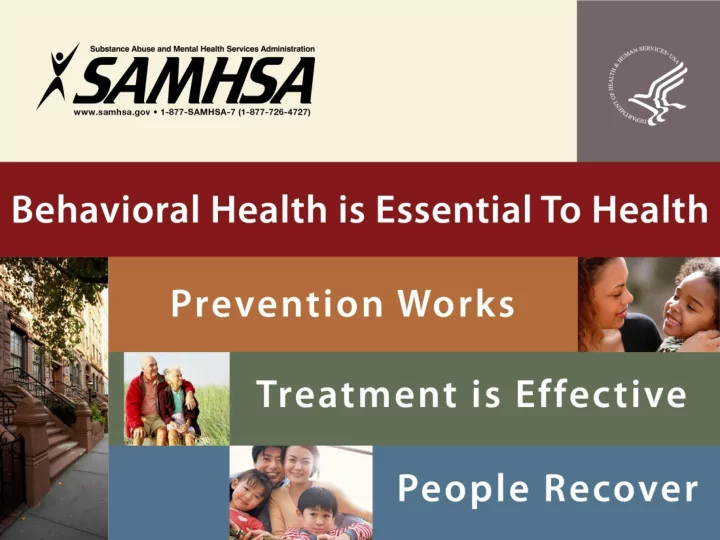

Evidence-Based Behavioral Health Services in Schools Helping Children with Serious Emotional Disturbance Succeed
SAMHSA Disclaimer • This webinar was developed [in part] under contract number HHSS283201200021I/HHS28342003T from the Substance Abuse and Mental Health Services Administration (SAMHSA), U.S. Department of Health and Human Services (HHS). The views, policies and opinions expressed are those of the authors and do not necessarily reflect those of SAMHSA or HHS.
Speakers • Dr. Tom Hehir, Harvard University • Ethan D’Ablemont -Burnes, principal, Manning School • Monica Causey, family member/parent advocate • Lewis Bossing, Bazelon Center
Topics for Discussion • Laws Supporting Inclusion • Evidence-based Practices • Supporting Principals, Teachers, Staff – As They Support Students • Family Engagement
Laws Supporting Inclusion • Individuals with Disabilities Education Act (IDEA). • Free Appropriate Public Education (FAPE) • Special Education • Related Services • Individualized Education Program (IEP) • Least Restrictive Environment (LRE)
Laws Supporting Inclusion • Americans with Disabilities Act (ADA) • Section 504 of the Rehabilitation Act • Anti-disability discrimination laws • Most integrated setting rule/ Olmstead • Unnecessary segregation is discrimination • Reasonable modifications to avoid discrimination
Laws Supporting Inclusion • Every Student Succeeds Act (ESSA) • a/k/a Elementary and Secondary Education Act (ESEA) • a/k/a No Child Left Behind (NCLB) Act • Schools Are Held Accountable for Helping Students with Disabilities Achieve Academic Proficiency
Evidence-Based Practices • Multi-Tiered Systems of Support • a/k/a Response to Intervention • Schools Provide High Quality Core Instruction • If Individual Students Need More Support, Evidence-Based Interventions • Moderate to High Intensity
Evidence-Based Practices • Multi-Tiered Systems of BEHAVIORAL Support • Schoolwide Positive Behavioral Interventions and Supports (PBIS) • Universal Expectations for Behavior • Intensive Interventions for Students Who Need Them
Evidence-Based Practices • Functional Behavioral Assessments (FBAs) • What are the ABCs? (Antecedents, Behaviors, Consequences) • Behavior Intervention Plans (BIPs) • Teaching, modeling, prompting, positively reinforcing desired replacement behavior • Redirection from disruptive behavior
Evidence-Based Practices • Other interventions that work: • Behavior coaching • Skills training, including social skills • Mentoring • Periodic check-ins • Trauma-informed therapy • Peer support • Transition services, including work activities • School-based case management
Evidence-Based Practices • Universal Design for Learning (UDL) • Multiple Means of Presenting Information • Multiple Means of Demonstrating Mastery • Multiple Means of Engaging Students • Customized Curriculum • Differentiated Instruction
Implementation • How do school districts support schools in serving students with severe emotional disturbance? • What are the resource gaps? • How can we repurpose resources? • How can we “braid” funding?
Implementation • How do principals support teachers in serving students with severe emotional disturbance? • Vision for Inclusion • Collaborative Problem Solving • Professional Development • Entrepreneurial Strategies
Family Engagement • Why involve parents or caregivers? • School age children spend 70% of waking hours outside of school • Family participation in education is a significant predictor of student achievement • The most effective form of parent involvement is parents working directly with their children (teaching, modeling, guiding) on learning at home
Family Engagement • Families should be part of developing the FBA • Parents are experts of the “why.” • Families should be part of implementing the BIP • Parents should implement behavioral interventions at home that are consistent with the school’s behavior plan for the child.
Family Engagement • What Works? • Positive first contact • Training school staff on customer service • Resources for teachers to build relationships with families • Strong message on the value of parents • Sponsor community rather than school events • Devote a “parent room” to sharing academic and community resources
Family Engagement • What Doesn’t Work? • Not providing training to front office staff • Communicating that parents and caregivers are a barrier to education • Scheduling meetings at times that are inconvenient for parents • Not seeking parents’ input on their training, information, or meeting needs • Not explaining to parents why doors are locked • Waiting until there’s an open house to communicate with families
Questions??
Resources • Bazelon Center webpage and publications at www.bazelon.org • Contact: • Lewis Bossing, Senior Staff Attorney • Bazelon Center for Mental Health Law • lewisb@bazelon.org • (202) 467-5730 x1307
Recommend
More recommend